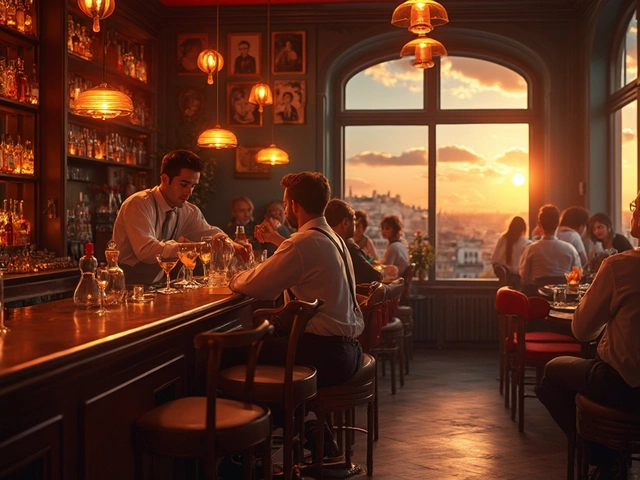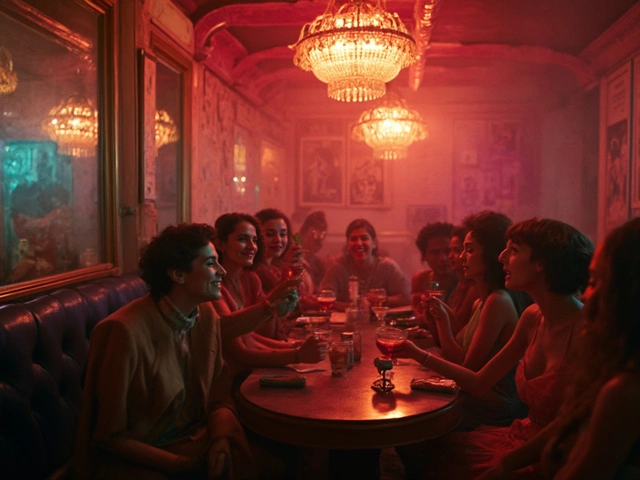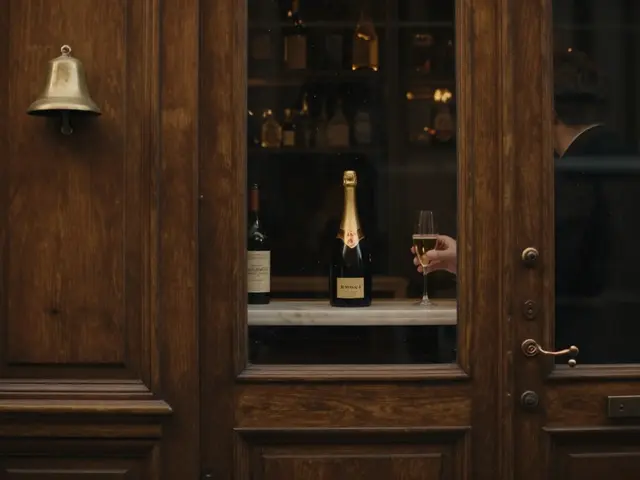
Ever noticed how cocktail menus in Paris seem to tell a story? It’s not just about gin or rum—there’s always a little French creativity mixed in, whether you’re at Le Syndicat in the 10th or Little Red Door in the Marais. Paris mixologists work with everything from old-school Cognacs to foraged herbs from regional markets. They aren’t afraid to break the rules, but they always keep that Parisian balance: bold flavors, never overdone.
If you’re used to cocktails elsewhere, you’ll catch the difference pretty fast. In Paris, bartenders care about where the booze comes from. Ask what’s local on the menu—odds are you’ll hear about a new distillery from Lyon or a syrup made in Belleville. And it’s not all classics; you’ll find kombucha spritzes and tonka-infused Old Fashioneds on offer—stuff you rarely see outside Paris.
Want to impress your friends (or your date)? Start by skipping the safe bet like mojitos and ask what the bartender recommends. Most Parisian mixologists love sharing their latest wild idea—sometimes there’s even a secret menu if you seem curious enough. If you’re feeling bold, try ordering in French: "Qu’est-ce que vous recommandez aujourd’hui?" Trust me, it opens doors in a Paris bar.
- Why Paris Mixologists Stand Out
- Classic Cocktails with a French Twist
- Secrets from the Best Bars in Paris
- How to Order Like a Local
- Spotlight: Rising Stars Behind the Bar
- Where to Find the Most Unique Cocktails
Why Paris Mixologists Stand Out
Walk into a Paris cocktail lounge and you’ll notice pretty quickly: these bartenders aren’t following a script. You’ll find a serious sense of pride in local ingredients and French spirits—think Cognac, Calvados, Suze, or even the return of Pastis in trendy new forms. There’s also a big respect for classic technique, but Paris mixologists aren’t stuck in the past. They test limits with homemade infusions, small-batch syrups, and French pantry surprises like verjus or fig leaf bitters.
The Paris cocktail scene exploded after 2010, when places like Experimental Cocktail Club and Candelaria led a small revolution. Now, the city is packed with award-winning bars: Le Syndicat is famous for only using French booze, while Little Red Door ranked on the World’s 50 Best Bars list for creative flavors and funky décor. Unlike noisy party spots elsewhere, Paris lounges invite you to talk to your bartender, ask questions, and basically geek out about drinks.
One local tip: a good Paris bartender never rolls their eyes at your questions—if you show some interest, they’ll probably tell you the story behind the recipe or even let you try a taste of that homemade gentian liqueur.
| Name | Location | Known For |
|---|---|---|
| Le Syndicat | 10th arrondissement | Only French-made spirits |
| Candelaria | 3rd arrondissement | Latin-inspired cocktails in a hidden taqueria |
| Little Red Door | Marais | Creative menus, sustainable ingredients |
| Experimental Cocktail Club | 2nd arrondissement | Pioneering the Paris cocktail revival |
Paris mixologists also keep up with global trends but put their own spin on things. For example, "low ABV" drinks—cocktails with less alcohol—are big in Paris because locals often want to enjoy a few rounds without rushing. And sustainable cocktail making isn’t just a marketing thing here: bars like Bisou and Combat use up every bit of their fruits and herbs, turning leftovers into syrups or garnishes.
The Paris cocktail lounges scene gets extra points for hospitality too. Regulars get remembered, and if you’re new, you’re welcomed the same way—no attitude, just real passion for good drinks made well.
Classic Cocktails with a French Twist
When you hit a Paris cocktail lounge, don’t expect the same old recipes you’ll find in London or New York. In Paris, bartenders love reinventing classics using locally sourced liqueurs, seasonal fruits, and a dash of French attitude. Even the everyday Negroni, normally full of Italian bitter and gin, gets a French spin with Suze (a gentian liqueur from the south of France) or French vermouth like Noilly Prat.
Take the French 75, for example—a cocktail born in Paris at Harry’s New York Bar sometime after World War I. The drink traditionally mixes gin, lemon, sugar, and Champagne. But in some Paris bars, you might find Cognac swapped for gin or house-made syrups standing in for simple sugar. The end result? It packs more flavor and personality.
The Sidecar is another all-time favorite with deep Parisian roots. It’s got only three ingredients—Cognac, Cointreau, and lemon juice—but bartenders play with the ratios or pop in craft French orange liqueurs for a twist. If you see “Sidecar revisité” or “avec une touche maison” (with a house twist) on a menu, it’s worth a try.
- Bartenders at Danico use local absinthes to riff on the Sazerac with a herbal, lighter profile than the New Orleans version.
- At Le Mary Celeste, their Bloody Mary includes local pickled veggies and a splash of spicy French mustard—it’s definitely not the hotel brunch version.
- Bistro Paul Bert jazzes up its Collins by infusing gin with strawberries from the Île-de-France region for a bright, Paris-in-the-spring taste.
Curious about what makes these drinks stand out? Parisian mixers care about their ingredients. In a recent survey, over 60% of Paris bars listed at least one French spirit on their signature cocktail menu.
| Classic | Parisian Twist |
|---|---|
| Negroni | Suze, French vermouth |
| French 75 | Cognac or champagne syrup |
| Sazerac | Local absinthes |
| Bloody Mary | Pickled veggies, French mustard |
| Tom Collins | Île-de-France strawberry gin |
If you ask Nicolas de Soto from Danico, he’ll tell you,
“A classic cocktail is just a starting point. In Paris, we use our own memories, ingredients from the market, and what’s in season to make it new.”
So keep an eye on the seasonal menus. What’s hot in spring may not even show up in autumn, and that’s half the fun of exploring cocktail bars in Paris.
Secrets from the Best Bars in Paris
Paris isn’t just about wine anymore. The city’s cocktail bars have shot up in quality, ranking alongside global hotspots. What’s behind this edge? It’s not flashy ice cubes or gold-leaf garnishes—it’s a mix of French know-how, a steady eye on new trends, and a bit of friendly competition between top spots like Little Red Door, Danico, and Le Syndicat.
Take Little Red Door in the Marais. They’re big on creative menus that actually make you think—last year’s theme focused on French terroirs, breaking down each drink by region, ingredient source, and even which local farmer grew the berries. At Le Syndicat, the secret is all-French booze. No imported rum or whiskey; you’ll taste Calvados from Normandy or a liqueur only Parisians know about. Danico, tucked behind a pizza joint in the old Bourse district, lets bartenders riff on Italian and French ingredients, turning Negronis into artsy flavor bombs.
Here’s the stuff that keeps locals coming back, and tourists lining up even on rainy Tuesdays:
- Bartenders aren’t just pouring; they’re experimenting. At Bisou on Boulevard du Temple, there’s no menu—describe your vibe, and they’ll improvise the rest.
- Fresh, local, and house-made everything. Enjoy syrups steeped right in-house, bitters crafted from French botanicals, and ice cut by hand for the perfect chill.
- Seasonal rotations matter. Expect a different experience every few weeks, with drinks that use what’s freshest at Parisian markets like Marché d’Aligre.
- French spirits rule. Try unusual options like Pineau des Charentes, Génépi, or a Cognac martini—these will pop up way more often than vodka or tequila.
Just to give you an idea of how seriously Paris takes its Paris cocktail lounges, here’s a quick breakdown of some top spots and what makes them unique:
| Bar | Location | Signature Move | Specialty Spirit |
|---|---|---|---|
| Little Red Door | Marais | Region-based menus | French brandy |
| Le Syndicat | Strasbourg-Saint-Denis | All-French spirits | Calvados, Cognac |
| Danico | Bourse | French-Italian combos | Vermouth, Amaro |
| Bisou | Oberkampf | Custom, no-menu drinks | Depends on your mood! |
Quick tip: don’t expect instant service if you order something complicated. Paris bartenders take their time, crafting each drink with a bit of ceremony. If you sit at the bar and watch, you’ll spot small details—like rare bitters, custom glassware, or that one local citrus you only find in Paris. That’s the stuff that keeps these spots ahead of the game.

How to Order Like a Local
If you walk into a Parisian cocktail lounge and ask for a “margarita” without looking at the menu, you'll probably get a polite smile and a nudge toward something more unique. The Paris scene is all about trying what’s new or local, so don’t be shy about asking for recommendations. Bartenders here love to talk about their craft and usually recommend what’s fresh or interesting on their list.
Start with a friendly greeting: “Bonsoir!” It goes a long way, and sets the right tone. Instead of immediately naming a drink, try saying, “Qu’est-ce que vous proposez ce soir ?” (What do you recommend tonight?). This shows you’re interested in what they do best, and more often than not, you’ll get pointed to a signature creation or something using French spirits like Chartreuse or Calvados.
- Stick to smaller groups, especially on weekends. Paris bars often have limited space and appreciate when guests respect the cozy setup.
- If the menu lists ingredients in French, don’t hesitate to ask for a quick explanation. Staff at well-known spots like Danico or Jefrey’s are used to curious customers.
- Tip isn’t required like in the U.S., but rounding up your bill or leaving one or two euros for great service goes a long way.
- When ordering a Paris cocktail lounge favorite, mention spirits you like. “J’aime le gin, qu’est-ce que vous avez de spécial ?” works wonders for getting something tailored to your taste.
The vibe in Paris lounges is relaxed yet attentive. If you’re waiting a bit, it’s not bad service—it’s just that making a perfect cocktail here takes time. Enjoy the atmosphere, people-watch, and soak in a bit of that Paris charm while your drink gets crafted just right.
Spotlight: Rising Stars Behind the Bar
Paris never runs short of fresh talent behind the bar. A new wave of Paris cocktail lounges is making waves thanks to ambitious bartenders—and they’re not shy about shaking things up. You see these faces popping up at international competitions and at the helm of bars everyone’s talking about this year.
One name on everyone’s lips right now is Baptiste Etcheverry at Le Syndicat. Known for using only French products, Baptiste’s twist on the classic French 75 uses Calvados and homemade elderflower syrup. His drink landed on the World’s 50 Best Bars shortlist. Then there’s Yecid Ortega at Danico in the 2nd—he got his start at experimental bars in Colombia and now crafts cocktails with French vermouth and wild herbs. His L’Inattendu (the Unexpected) is pure Instagram bait.
Another face to watch: Paloma Latrive at Bisou on Boulevard du Temple. She skips menus entirely and just asks customers what flavors they want. Locals say she never needs more than a few questions to nail your ideal drink, whether you love bitter, floral, or spicy. Over at combat Belleville, Fanny Moreaux is all about sustainability—she reuses citrus peels in syrups and her bar only stocks French spirits. If you’re into eco-friendly sips, she’s got you covered.
Wondering how these up-and-comers are changing Paris’s cocktail landscape? Here’s a quick look at their impact:
| Mixologist | Bar | Signature Style | Recognition |
|---|---|---|---|
| Baptiste Etcheverry | Le Syndicat | French ingredients, creative twists | World's 50 Best Bars shortlist |
| Yecid Ortega | Danico | International flavors, herbal infusions | Mixology Magazine "Top 10 to Watch" 2025 |
| Paloma Latrive | Bisou | No menu, flavor-focused creations | Best Paris Bartender Finalist 2024 |
| Fanny Moreaux | Combat Belleville | Eco-friendly techniques, French spirits | Time Out Paris Sustainability Award |
If you want to experience these rising stars, drop by early—by 8:30 pm the best spots are usually packed. Don’t be shy to chat with the bartender and mention one of their signature drinks. You might just get the inside scoop on something off-menu, or at the very least, a drink story to tell.
Where to Find the Most Unique Cocktails
If you want to go beyond the usual mojito or negroni, Paris has some spots where the cocktails are the main event and not just an afterthought. Some Paris cocktail lounges are basically labs, always experimenting and surprising regulars with things you won’t find on any other menu in France—maybe not even in Europe.
For a start, Little Red Door in the Marais is famous for their ever-changing concept menus. One year, they based their drinks on abstract art. Another year, it was French ingredients that get overlooked, like roasted chicory or wild fennel. When you show up, ask what’s new—staff love explaining the story behind each creation.
Le Syndicat on Faubourg Saint-Denis is another game changer. The focus here is on French spirits that almost nobody outside the country knows about—think Armagnac, Suze, and gentian liqueurs. The bar’s mission is summed up by co-owner Sullivan Doh in this quote:
"It’s about putting French terroir in your glass. We want to show people that local spirits can be just as interesting as big-name imports."
If you care about the numbers, Paris currently counts over 250 bars with custom cocktail menus—and at least 45 of them change their menu for each new season. The demand for fresh, inventive drinks has more than doubled since 2019, based on reservation data from TheFork:
| Year | Bespoke Cocktail Bars | Bars Changing Menus Seasonally |
|---|---|---|
| 2019 | 120 | 18 |
| 2022 | 190 | 32 |
| 2025 | 250+ | 45+ |
Want to sip something you can brag about? Here’s a quick checklist for unique cocktail hunting in Paris:
- Look for bars that post their menu updates on Instagram or Facebook. Examples: Danico, Bisou, Candelaria.
- Book ahead if you’re going out on Friday or Saturday. The most creative bars get packed.
- Ask the bartender about off-menu or "one-night-only" drinks. If you’re polite and curious, you might get lucky!
- If you’re not into alcohol, plenty of these places have wild mocktail options using homemade syrups or rare teas.
Hit any of these bars armed with a bit of curiosity, and you’ll find out pretty quickly why Paris is at the center of Europe’s cocktail revolution.








